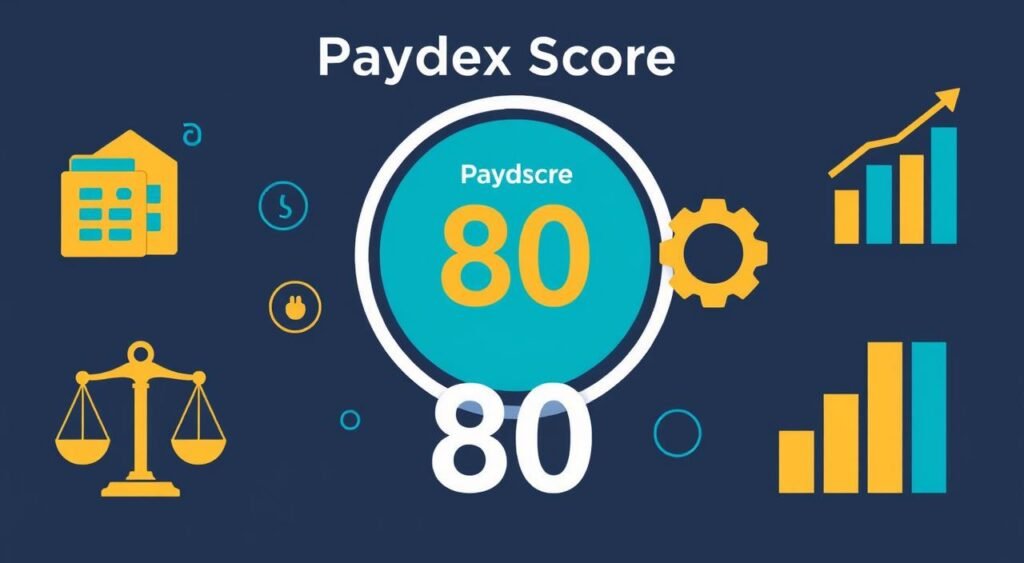Did you know a Dun & Bradstreet Paydex score, from 1 to 1001, is key for your business? It affects financing, supplier relationships, and your financial reputation2. This score is more than a number; it shows your company’s financial management and trustworthiness. A high score means your business is reliable and trustworthy to others.
Key Takeaways
- A high Paydex score shows your business is financially healthy and trustworthy to creditors and suppliers.
- It shows you’re good at making payments on time and keeping strong trade relationships.
- It can help you get better financing, credit terms, and business opportunities.
- It shows your company is reliable and trustworthy in the business world.
- Keeping a good Paydex score is important for getting good financing and improving your financial position.
What is a Paydex Score?
A Paydex score is a business credit score from Dun & Bradstreet, ranging from 1 to 100. It shows how likely a company is to pay its bills on time3. It’s different from personal credit scores because it only looks at a business’s payment history with vendors and suppliers3.
Understanding the Significance of Paydex Scores
Paydex scores are key to showing a company’s creditworthiness. They help in getting financing, better terms with suppliers, and building strong business partnerships3. A score above 80 means low risk, while below 50 means high risk3.
How Paydex Scores Differ from Personal Credit Scores
Paydex scores focus only on a business’s payment history with suppliers3. Dun & Bradstreet suggests having at least three trade references from two different suppliers for an accurate score3. Larger payments have more impact on the score3.
It’s important for businesses to understand Paydex scores to build strong credit profiles4. Scores range from 1 to 100, with 80 or higher being very good4.
“A perfect PAYDEX score of 100 indicates consistently paying off debts 30 days early.”4
Paydex scores greatly affect a business’s ability to get good purchasing terms, loans, and even insurance premiums4. Keeping a strong Paydex score is vital for business success and growth5.
The Tangible Benefits of a High Paydex Score
A high Paydex score can open many doors for your business. Paydex is a score by Dun & Bradstreet that shows how reliable your company is6. Lenders look for a score of 80 or more, which means your business is seen as low-risk6.
Having a strong Paydex score can really help your business. It makes it easier to get loans and credit at good rates7. It can also lower your insurance costs, as insurers see you as a trustworthy partner6.
A high Paydex score also helps with suppliers and vendors. Companies with good payment histories get better deals, like longer payment times or discounts6. This can boost your cash flow and financial health.
In short, a high Paydex score shows your business is trustworthy and reliable. It leads to more opportunities, like better financing and deals with vendors6. Keeping a strong Paydex score helps your business grow and improves its financial reputation6.

“A high Paydex score is a powerful asset in the world of business credit. It demonstrates your company’s commitment to timely payments and financial responsibility, ultimately leading to a host of tangible benefits.”
| Credit Scoring System | Favorable Score Range |
|---|---|
| Small Business Score by FICO | 140 and above |
| PAYDEX by D&B | 80 and above |
| Business Credit Report by EQUIFAX | 570 and above |
| CreditScore by Experian | 76 and above |
A Paydex score of 80 or more is good for lenders and financial institutions6. This score, along with others, brings many benefits to your business6.
Understanding the Dun & Bradstreet score benefits and managing your Paydex score can make your business more attractive. This opens up new chances for growth and success67.
Factors Influencing Paydex Score Calculations
For businesses, knowing what affects Paydex scores is key. A Paydex score is based on how well a company pays its vendors and suppliers. Dun & Bradstreet uses this data to give a score from 1 to 100. A score of 80 or higher is seen as good for making payments on time8.
The Role of Trade References in Paydex Scores
Trade references play a big role in Paydex scores. A business needs a D-U-N-S number and at least three trade experiences from two references to get a score8. The more references, the better the score will be.
The Impact of Payment History and Dollar-Weighting
Payment history and the size of transactions also matter for Paydex scores8. Larger payments have more weight in the score. This shows a company’s ability to handle big financial tasks8. Dun & Bradstreet looks at the last two years of payments to score a business8.
Knowing what affects Paydex scores helps businesses improve. This can lead to better financing, terms with suppliers, and more trust from partners and clients9.

Paydex Score Benefits
A high Paydex score brings many benefits to businesses in today’s competitive world10. It makes it easier to get financing and credit10. Lenders see a strong score as a sign of low risk, leading to better loan terms10.
Improved Access to Financing and Credit Options
With a high Paydex score, businesses can find more financing options10. This makes it easier to get loans, lines of credit, and other capital for growth10. This financial freedom is key to a company’s success and competitiveness10.
Favorable Supplier and Vendor Terms
A high Paydex score also means better deals with suppliers and vendors10. Businesses can get longer payment terms, discounts, and priority access to products10. These benefits help build strong relationships and financial stability1011.
In summary, a high Paydex score is very valuable for businesses11. It opens the door to many financial and operational benefits that lead to long-term success11.

| Paydex Score Range | Credit Risk Level | Supplier Terms |
|---|---|---|
| 80-100 | Low | Favorable |
| 50-79 | Moderate | Decent |
| 0-49 | High | Limited |
“A higher PAYDEX Score (ideally 80 or above) implies a strong track record of paying suppliers early or on time, which fosters better business relationships.”10
Strategies for Maintaining a High Paydex Score
Keeping a high Paydex score is key for businesses. It helps get better credit terms, lower interest rates, and more financing access. To achieve this, businesses need to show they are reliable and trustworthy12.
Timely Payment Practices for Businesses
On-time payments are the base of a good Paydex score. Paying bills and invoices before they’re due shows financial responsibility. This can get your Paydex score to 80 or higher12.
Making payments early can boost your score even more, especially for big payments12.
Encouraging Trade Reference Reporting
To get a full Paydex score, businesses need at least two tradelines with three credit experiences reported to Dun & Bradstreet12. Getting vendors and suppliers to report payment experiences helps improve your score. The more reports, the better the creditworthiness assessment13.
Also, having a variety of vendor relationships and paying Net 30 vendors on time can improve your Paydex score and business credit13.
By using these strategies and keeping an eye on your Paydex score, businesses can do well. They can get better credit terms, lower interest rates, and more capital to grow13.
The Widespread Use of Paydex Scores
Paydex scores are key in the business world. Many organizations use them to check if a company is financially stable14. Lenders and banks especially look at Paydex scores when deciding on loans and credit limits14.
Insurance companies might use Paydex scores to set business premiums. Landlords and business partners also check these scores to see if it’s safe to work together14. This shows how important it is for businesses to have a good credit score to grow and succeed.
Lenders and Financial Institutions’ Reliance on Paydex Scores
Paydex scores are crucial for lenders and banks14. A score of 80 to 100 means a company pays bills on time or early14. This can lead to better loan terms and more credit options15.
Lower scores, like 50 to 70, mean bills are paid somewhat late14. Scores under 50 show big payment problems14. Lenders use these scores to decide how risky a business is and what terms to offer15.
Businesses need to keep their credit score high14. Paying bills on time and managing credit well can improve scores15. This opens up better financing options and helps businesses grow in the long run15.
Interpreting Paydex Score Ranges
The Paydex score is key to knowing if a business is creditworthy. It ranges from 1 to 100 and shows how well a company pays its bills16. A score of 100 means a business pays early, while 80 means it pays on time16.
Businesses with scores of 80 or higher are seen as low risk16. Scores between 50 and 79 are medium risk, showing payments are late by 2 to 30 days16. Scores under 50 are high risk, with payments 31 to 120 days late16.
Knowing these ranges helps businesses check their credit and improve payment habits1617. A high Paydex score shows a company is reliable and trustworthy. This can help get better loans and deals from suppliers and partners.
| Paydex Score Range | Risk Level | Payment Timeliness |
|---|---|---|
| 80 and above | Low Risk | Payments made 30 days or more early |
| 50 to 79 | Medium Risk | Payments made 2 to 30 days late |
| Below 50 | High Risk | Payments made 31 to 120 days past due |
Understanding Paydex score ranges helps businesses manage their finances better. This knowledge is key to success in the competitive market.
Monitoring and Improving Paydex Scores
Keeping an eye on your business’s Paydex score is key to a strong credit profile5. Scores range from 1 to 100, with 100 being perfect5. A score of 75 or higher means you’re likely to pay on time5. But, scores under 40 show a poor payment history5.
Subscription Services and Tools for Tracking Paydex Scores
Dun & Bradstreet offers tools like CreditSignal to track your Paydex score5. These services alert you to any score changes or issues5. They help you manage your credit and find ways to improve.
Best Practices for Boosting Paydex Scores
To boost your Paydex score, follow some key practices18. Pay bills on time and encourage positive trade references5. Avoid late payments at all costs5.
Consistent payments and reducing credit use can also help18. Fixing any credit report issues is crucial too18.
By improving your Paydex score, you can get better financing and build stronger supplier relationships18.
| Paydex Score Range | Implications |
|---|---|
| 100 | Consistent 30-day early payments |
| 75 and above | Low risk, timely repayments |
| Below 75 | High risk of late payments |
| Below 40 | Poor payment history |
Conclusion
A high Paydex score is more than just a number. It shows your business’s financial health and trustworthiness. Knowing how Paydex scores work and their benefits can help your business grow. This includes better access to loans and better deals with suppliers.
Keeping an eye on your Paydex score is crucial for any business. It helps improve your financial standing and builds strong relationships. Good financial habits, like paying bills on time, can boost your score. This opens doors to more funding and better supplier deals.
Understanding Paydex scores and managing your business’s credit well is key. It sets your business up for success in today’s market. With the right strategies, your business can thrive and grow.
FAQ
What is a Paydex Score?
How do Paydex Scores differ from personal credit scores?
What are the benefits of a high Paydex score?
What factors influence Paydex score calculations?
How can a high Paydex score improve access to financing and credit options?
What strategies can businesses use to maintain a high Paydex score?
How are Paydex scores used by different organizations?
How can businesses interpret Paydex score ranges?
How can businesses monitor and improve their Paydex scores?
Source Links
- Introduction To Business Credit Rating Scale – FasterCapital – https://fastercapital.com/topics/introduction-to-business-credit-rating-scale.html
- Business credit rating scale Understanding the Importance of Business Credit Rating Scale – FasterCapital – https://fastercapital.com/content/Business-credit-rating-scale-Understanding-the-Importance-of-Business-Credit-Rating-Scale.html
- What Is A Paydex Score? | Bankrate – https://www.bankrate.com/credit-cards/business/what-is-paydex-score/
- D&B PAYDEX Score FAQ – Business Credit Score Guide – https://northshoreadvisory.com/business-credit/business-credit-scores/dnb-paydex-score-faqs/
- PAYDEX Score: The Dun & Bradstreet Business Credit Rating – https://www.nav.com/business-credit-scores/dun-bradstreet-paydex/
- What is a Good Credit score: Tips for Improvement – https://fundkite.com/blog/what-is-good-business-credit-score/
- Build Business Credit: Do It Now – Aged Shelf Corporations to Build Bussiness – https://financialci.com/build-business-credit-do-it-now/
- Understanding the Paydex Score – https://www.businessinsider.com/personal-finance/credit-score/what-is-paydex-score
- PAYDEX Score: The Dun & Bradstreet Business Credit Rating – https://ramp.com/blog/what-is-a-paydex-score
- PAYDEX Score: The Only Ultimate Guide You Need To Read – https://www.forbes.com/advisor/credit-score/paydex-score/
- What is PAYDEX Score | Gaviti – https://gaviti.com/glossary/paydex-score/
- How to Get an 80 PAYDEX Score | eCredable – https://business.ecredable.com/resources/blog/how-to-get-80-paydex-score
- The Essential Guide to Understanding What is a Paydex Score and Net 30 Vendors – https://theceocreative.com/the-essential-guide-to-paydex-scores-and-net-30-vendors/
- Paydex Scores: Your Key to Small Business Financial Success. – https://www.paycron.com/blog/unlocking-financial-success-a-comprehensive-guide-to-paydex-scores-for-small-businesses
- PAYDEX Score: The Only Ultimate Guide You Need To Read – https://www.linkedin.com/pulse/paydex-score-only-ultimate-guide-you-need-read-echeckplan-6qgze
- What Is a Good Business Credit Score? | Nav – https://www.nav.com/resource/what-is-a-good-business-credit-score/
- What Is a Good Business Credit Score? – https://finmasters.com/good-business-credit-score/
- What is a Paydex Score — Key to Business Creditworthiness! – https://www.linkedin.com/pulse/what-paydex-score-key-business-creditworthiness-paycron-inc-cptee

